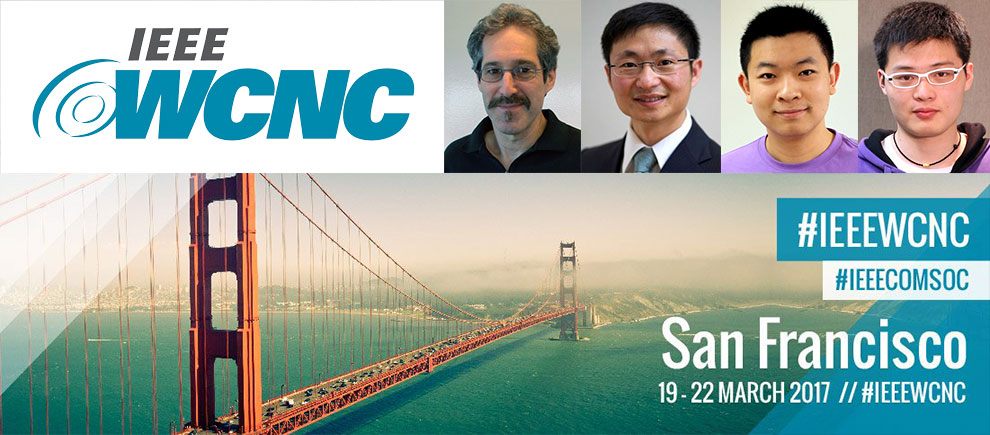EECS Ph.D. Student Zhiyi Zhou & Alumnus Xu Chen Win Best Paper Award at IEEE WCNC
The groups winning paper, is titled, "Sparse Channel Estimation for Massive MIMO with 1-bit Feedback per Dimension.”

EECS Ph.D. Student Zhiyi Zhou, Alumnus Xu Chen (Ph.D. 16'), Prof. Dongning Guo, and Prof. Michael L. Honig of the Communications and Networking Lab have won the "Best Paper Award" at 2017 IEEE Wireless Communications and Networking Conference (IEEE WCNC), to be held March 19 - 22 in San Francisco, CA.
The groups winning paper, is titled, "Sparse Channel Estimation for Massive MIMO with 1-bit Feedback per Dimension.” The first author Zhiyi Zhou is a 4th-year Ph.D. student, whose research interests include a variety of topics from wireless communicatoin networks to resource allocation, network optimization, and game theory. The second author Xu Chen is currently a Senior Engineer at Apple, whose research interests include information theory, coding theory and compressed sensing, while his current focus is on Internet of Things (IoT), building the mathematical model, studying the fundametal limit and designing practical algorithms. Prof. Guo, and Prof. Honig have Advised both authors.
Abstract Summary: In massive multiple-input multiple-output (MIMO) systems, acquisition of the channel state information at the transmitter side (CSIT) is crucial. In this paper, a practical CSIT estimation scheme is proposed for frequency division duplexing (FDD) massive MIMO systems. Specifically, each received pilot symbol is first quantized to one bit per dimension at the receiver side and then the quantized bits are fed back to the transmitter. A joint one-bit compressed sensing algorithm is implemented at the transmitter to recover the channel matrices. The algorithm leverages the hidden joint sparsity structure in the user channel matrices to minimize the training and feedback overhead, which is considered to be a major challenge for FDD systems. Moreover, the one-bit compressed sensing algorithm accurately recovers the channel directions for beamforming. The one-bit feedback mechanism can be implemented in practical systems using the uplink control channel. Simulation results show that the proposed scheme nearly achieves the maximum output signal-to-noise-ratio for beamforming based on the estimated CSIT.
The Communications and Networking Laboratory's research draws on a wide range of techniques including information theory, communication theory, networking, signal processing, optimization and stochastic modeling to advance our understanding of the theoretical limits of communication systems as well as to design novel algorithms for approaching these limits.
IEEE WCNC is the only IEEE conference focused exclusively on wireless research, technology, and applications. It brings together thought leaders from industry, academia, government agencies and other institutions to exchange information and ideas on advancing the state-of-the-art in wireless communications and networking. Located in the heart of Silicon Valley, the conference aims to serve as a catalyst in bringing together participants from academia and industry to help foster new connections and ideas. The conference will feature a comprehensive technical program with technical tracks on wireless research, technology, applications and services. In addition, the conference program includes workshops, tutorials, and panel discussions on today’s state-of-the-art as well as what the wireless future will look like. An expanded industry program, including a large exhibition hall showcasing the latest wireless technology, will provide opportunities for industry professionals to share and learn about the latest ideas, trends, and product innovations in the wireless industry.
